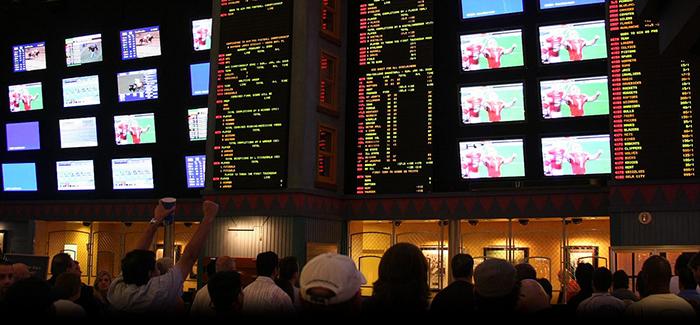
Gamblers watching a football game in Las Vegas. (Photography by Antony Pranata, CC BY-NC-ND 2.0)
Chicago trader David Frohardt-Lane, SM’00, put his statistics education to lucrative use.
The best sports bettors have a success rate of about 54 percent, says David Frohardt-Lane, SM’00, and anything higher is luck. He should know; the Chicago trader won $557,850 last December in Las Vegas’s largest handicapping contest by nailing a record 67.9 percent of his picks.
Every week during football season, the 1,028 entrants in the Las Vegas Hotel and Casino SuperContest picked five NFL games against the point spread. In Week 17, for example, Frohardt-Lane picked San Francisco (-1), meaning he thought San Francisco would beat Arizona by more than one point. The whole contest came down to that game. With two seconds left and the score tied, the 49ers’ Phil Dawson nailed a 40-yard field goal, winning the game for San Francisco and the SuperContest for Frohardt-Lane.
After spending all day checking the score on his iPhone at his brother-in-law’s wedding reception, Frohardt-Lane got in front of a television for the final kick. “Just looking at my iPhone, I felt helpless,” he told the Associated Press. “But just seeing the game, I started to regain my confidence.”
Frohardt-Lane started watching sports in 1984, when his hometown Detroit Tigers won the World Series after an MLB-record 35–5 start. He was seven years old. “I had no idea that it would not be this easy,” he says. “Like, I could live a full life and die without ever seeing the Tigers win another World Series. It’s incredible.”
To celebrate, a relative gave him Bill James’s 1985 Baseball Abstract—the pioneering sports statistician’s take on the year in baseball—and a couple years later, he was hooked. “My dad was a math professor, so I’ve always been interested in numbers,” explains Frohardt-Lane. “I love just playing pickup football, basketball, whatever, but I was terrible, I never played on a team or anything.”
He kept up with advanced sports statistics but didn’t think seriously about handicapping until his second year as a math major at Carleton College, when he made a model to predict the results of NFL games.
“Until that point I just assumed that markets are totally efficient,” including Vegas, and that trying to beat the oddsmakers is futile, Frohardt-Lane says. His “simple” model would have beaten the line on over 60 percent of games over the previous five years. “That kind of just changed my whole thinking.”
So he enrolled in the PhD statistics program at UChicago, leaving after a year with a master’s. “It ended up being a naïve idea,” he says. “I just like numbers, and I didn’t appreciate that at the graduate school level statistics ceases to be about numbers and starts to be more like analysis.”
Frohardt-Lane headed to California, taking “frankly unambitious” jobs at Wells Fargo and the now-defunct NextCard to focus his energy on betting baseball. After hundreds of hours spent looking for factors with predictive value, he built a model in the stats program R with individual projections for every player based on past performances. A second model, built in C, simulates each game thousands of times and identifies the probability of every discrete outcome for each batter’s appearance at the plate: walk, strikeout, hit, out, and homer. Another model he designed for football predicts final scores.
By the end of 2003, Frohardt-Lane had worked his bankroll from $10,000 to almost $100,000, betting $1,000 to $2,000 per game. “I love having some skin in the game,” he says. He still considers himself a sports fan—“When the Tigers had their runs in ’06 and ’12, I was really into it,” he says—but gambling comes first. And in fact, he says, the experience of having money on the line is similar to that of being a fan. “You have something you’re rooting for, and you just root for that,” even if it means cheering against his hometown teams. “If the model says bet Detroit or fade Detroit”—meaning, bet against—“that’s what I’ll do.”
In 2004 Frohardt-Lane moved to Chicago and took a job at trading firm Getco (now KCG Holdings), which left less time for gambling. Increasingly restrictive sports betting laws also made it harder. But in the fall of 2011, looking for a way to bet more often than his annual trips to Vegas, Frohardt-Lane jumped at the chance to compete in high-stakes handicapping contests. That year he won the Cantor Football Contest, beating out 14 other entries for $75,000.
The sports world took notice; since last summer, Frohardt-Lane has been consulting for a major league sports team, although they’ve asked him to keep mum. Sports teams “are a lot smarter than you think,” says Frohardt-Lane. “I think ten years ago they were far behind the public even, and I just don’t think they are anymore.”
Frohardt-Lane’s trust in data even extends to what he does with his winnings; he donated half of his contest windfall to GiveWell, a nonprofit that evaluates other charities. “They think in terms of probabilities and expected values,” he says. “They talk about expected return on dollar invested.”
Frohardt-Lane does play fantasy football to keep up with old friends—model-free—and his wife of five months doesn’t mind his sports betting. “She just kind of writes it off as the one quirky thing, maybe not the one, but one quirky thing she has to deal with.”
